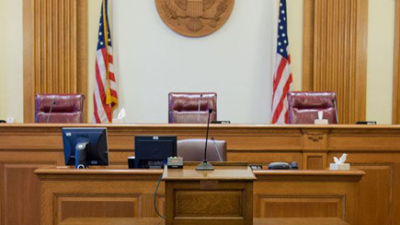Due Process and the Courts
What does the constitution say about due process?
The Fifth Amendment to the Constitution says clearly that no person shall be deprived of life, liberty, or property without the due process of law. Note that this says person, not citizen, and over the years the Supreme Court has consistently ruled that the Due Process Clause applies to all people in the United States.Do non-citizens have the right to due process in the U.S.?
Yes. The Constitution guarantees due process rights to all "persons," not just citizens. This means non-citizens, including undocumented immigrants, are entitled to fair treatment under the law. This includes the right to defend themselves in court. But recent Trump administration policies that speed up deportations and limit access to legal representation make it harder for non-citizens to get their fair day in court.- Access to legal representation Access to legal counsel is an essential part of our justice system and our democracy. In the criminal justice system, anyone facing even one day in jail gets a lawyer if they can't afford one. But immigrants facing deportation usually don't get that chance.The research is clear – the most effective way to ensure some level of due process for people navigating our complicated immigration system is for them to have trained attorney at their side. But Trump administration is now working to strip attorneys from as many people as possible, all in the name of increasing its deportation numbers. This attempt to eliminate basic due process will hurt people who already have few options.
- Fair day in court Due process guarantees that individuals have the opportunity to defend themselves in court. This includes non-citizens facing deportation.
Why is due process important?
We are seeing right now the importance of due process when it comes to President Trump's actions to carry out the so-called Alien Enemies Act, a 1798 wartime law that permits people to be deported outside of the normal framework of immigration law. President Trump has alleged that this law allows him to simply point at any person, declare them to be an alien enemy, and kick them out of the country without ever having a chance to see a judge. Thankfully, the Supreme Court said that is not true, and in a unanimous decision, ruled that people can challenge the Trump administration's invocation of the Alien Enemies Act. That is why due process is so important, because it means that no person can be rounded up and sent to another country without a chance to go to court and make the government prove their case.How is the American Immigration Council working to protect due process?
- We serve thousands of individuals in immigration detention centers through the Immigration Justice Campaign, our initiative with the American Immigration Lawyers Association. The Justice Campaign provides free legal services for immigrants who would otherwise have to navigate our complicated immigration system without a lawyer.
- We use the courts to demand a fair process for immigrants. Our litigation team is fighting back against the Trump administration’s blatant disregard for due process including filing a lawsuit challenging their illegal detention of immigrants in El Salvador’s notorious Terrorism Confinement Center (CECOT).

Voluntary Departure
This Practice Advisory addresses when the voluntary departure period runs and the events that cause automatic termination of a voluntary departure order; the serious consequences that result from failing to depart; and when these consequences do not apply. Read More

Employment Authorization and Asylum: Strategies to Avoid Stopping the Asylum Clock
The American Immigration Council’s Practice Advisory, Employment Authorization and Asylum: Strategies to Avoid Stopping the Asylum Clock, has been updated to reflect extensive changes to the manner in which the United States Citizenship and Immigration Services (USCIS) and the Executive Office for Immigration Review (EOIR) determine an asylum applicant’s eligibility for an Employment Authorization Document (EAD). Read More

Failure to Appeal to the AAO: Does it Bar all Federal Court Review of the Case?
This Practice Advisory discusses whether and how a person can get review of a U.S. Citizenship and Immigration Services decision in federal court if he or she did not appeal the decision to the Administrative Appeals Office (AAO). The Advisory addresses the Supreme Court case Darby v. Cisneros, holding that a plaintiff is not required to exhaust non-mandatory administrative remedies in certain situations, and how it may apply to cases involving appeals to the AAO. Read More

Federal Court Jurisdiction Over Discretionary Decisions After REAL ID
This Practice Advisory discusses the changes that the REAL ID Act made to INA § 242(a)(2)(B) and outlines an analysis for whether §242(a)(2)(B) applies to a particular case. It also discusses federal court jurisdiction over discretionary decisions after the REAL ID Act in the removal and non-removal contexts. The government has asserted this jurisdictional bar in employment-based, family-based, and humaritarian-based immigration cases. Read More

How To File A Petition For Rehearing, Rehearing En Banc And Hearing En Banc In An Immigration Case
This Practice Advisory discusses the procedures and requirements for filing a petition for rehearing, rehearing en banc or hearing en banc in the court of appeals.

How to File a Petition for Review
Noncitizens may file a petition for review in the court of appeals to seek judicial review of a final removal order. This Practice Advisory addresses the procedures and general requirements for filing and litigating a petition for review. Read More

How to Get Judicial Relief Under 8 USC 1447(b) for a Stalled Naturalization Application
Section 336(b) of the INA, 8 U.S.C. § 1447(b), gives a district court jurisdiction to intervene in a case where USCIS has failed to make a decision on the naturalization application within 120 days of the applicant’s “examination” by USCIS. This Practice Advisory discusses the nuts and bolts of bringing a suit under INA § 336(b). It also discusses when attorneys fees under the Equal Access to Justice Act are available. Read More

Introduction to Habeas Corpus
This Practice Advisory offers a short introduction to habeas corpus, addressing when and how a petitioner may file a petition for writ of habeas corpus in the immigration context.

Judicial Review Provisions of The REAL ID Act
On May 11, 2005, the REAL ID Act was signed into law. This Act contains numerous provisions related to federal court review of immigration cases. This Practice Advisory discusses the provisions of the Act that pertain to judicial review of immigration decisions under the INA. Read More

Motions to Suppress in Removal Proceedings: A General Overview
This Practice Advisory provides a general overview of motions to suppress, a tool used to prevent the introduction of evidence obtained by federal immigration officers in violation of the Fourth Amendment, Fifth Amendment, and related provisions of federal law. Read More
Make a contribution
Make a direct impact on the lives of immigrants.
